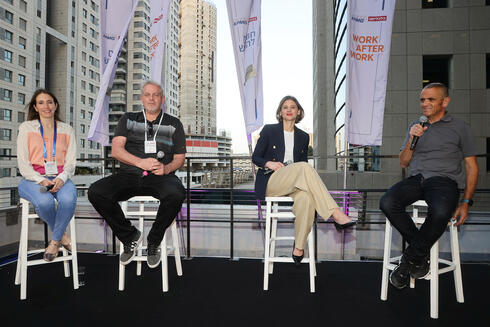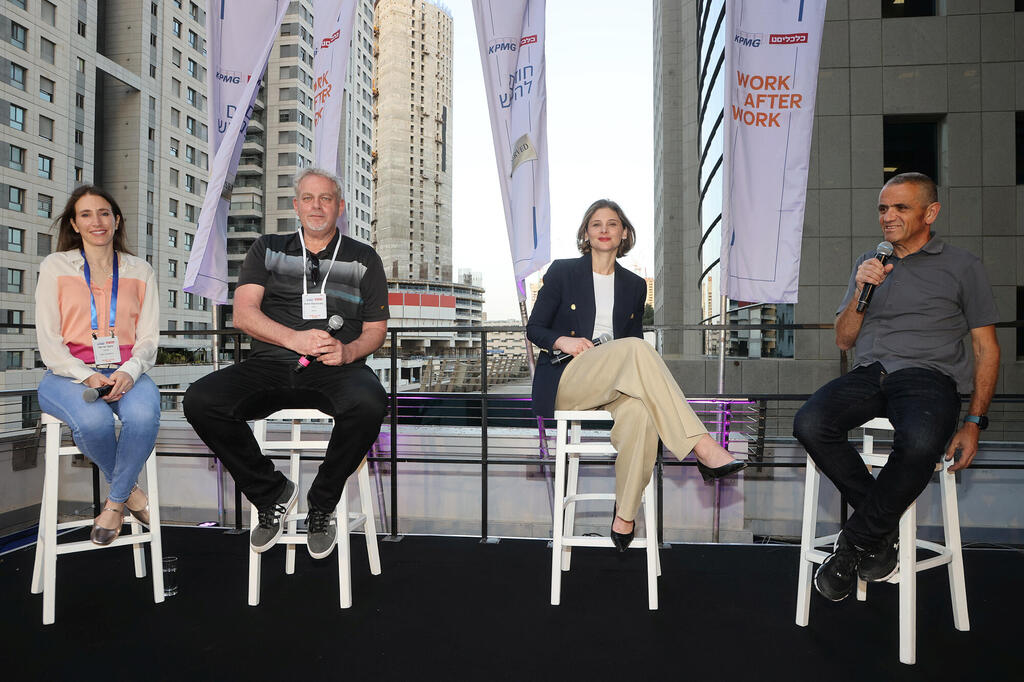
"Israel faces a pivotal moment where it can choose between dwelling on past hardships or seizing the opportunity for growth"
Amir Haramaty, founder and CEO of aiOla, was speaking on a panel held as part of Calcalist and KPMG’s Work After Work event with Nicole Priel, a Partner at Ibex Investors, and Dina Pasca-Raz, partner and Head of Technology at KPMG Israel
In a dynamic era marked by societal unrest, military conflicts, and burgeoning technological advancements, the Israeli high-tech sector finds itself at a pivotal crossroads. Against the backdrop of turmoil, a panel of industry experts convened at the Calcalist and KPMG Work After Work event to dissect the state of affairs and chart a course for the future. Led by Calcalist reporter Meir Orbach, the discussion delved into the complexities of recent market trends, the impact of geopolitical instability on entrepreneurship, and the shifting landscape of venture capital. Nicole Priel, Partner at Ibex Investors, Amir Haramaty, CEO of aiOla, and Dina Pasca-Raz, Partner and Head at Technology KPMG Israel, lent their insights to unravel the enigma of Israel's tech resurgence amidst global turmoil.
According to Pasca-Raz, "quite a few reports are being published that summarize 2023 as not being a good year for the venture capital industry in the world and in Israel, and on the other hand there is optimism that sees exits and recruitment rounds happening. On the one hand the decline in 2023 was part of a global cycle, and there is no doubt that there was also an effect on the instability in Israel, but we were in the midst of a global tsunami. On the other hand, the optimism is not necessarily from what we see now because we are eating bread from granaries that were filled three or four years ago. The question is how do we make sure that the granaries stay full, and how do we incentivize the entrepreneurs to set up companies in Israel?"
According to Pasca-Raz, "Several reports have been published summarizing 2023 as a challenging year for the venture capital industry globally and in Israel. Despite this, there is optimism regarding exits and fundraising rounds. The decline in 2023 was influenced by global economic cycles, compounded by instability in Israel. However, the current optimism may be attributed to past successes, raising the question of how to sustain this momentum and incentivize entrepreneurs to establish companies in Israel. This is an issue that requires our attention."
Nicole, as an investor, you interact with various companies. Have recent events such as the war or political unrest affected entrepreneurs or the high-tech industry? Do you sense optimism in the first quarter of 2024?
"More than optimism, we sense a market recovery, particularly in seed and early-stage recruitment, as well as in the cybersecurity sector. We anticipate increased investments, acquisitions, and possibly one or two IPOs later this year," replied Priel.
Amir, as an entrepreneur, how do you perceive the market? Is there a change in attitude towards Israeli companies?
Haramaty expressed, "If we had challenges before, they have only intensified. However, there are positive signs, as illustrated by recent interactions with international companies expressing a newfound appreciation for Israeli technology. It's encouraging to witness this recognition of our capabilities. Ultimately, in business, the focus is on value creation rather than geographical origins.
"I served as a combat soldier and was wounded in Lebanon, an experience that reshaped my perspective on life. I've learned to view challenges as opportunities for growth, embracing the concept of post-traumatic growth rather than succumbing to post-traumatic stress. As a country, we face a pivotal moment where we can choose between dwelling on past hardships or seizing the opportunity for growth," he added.
Regarding the trend of Israeli companies registering in Delaware, Pasca-Raz expressed concerns about its implications and advocated for legislative changes to promote local entrepreneurship. Nicole highlighted the advantages of registering in Delaware but acknowledged the importance of considering all factors, including eligibility for grants. Amir emphasized his commitment to Israel and the importance of making decisions aligned with national interests.
The Innovation Authority's efforts to encourage Israeli institutions to invest in high-tech were discussed, with Pasca-Raz emphasizing the need for expertise in such initiatives. Nicole indicated that while it doesn't align with their model, Ibex Investors remains dedicated to investing in Israeli companies. Amir commended the authority's initiatives and highlighted the potential of the AI industry.
Nicole cautioned against premature investments in AI, emphasizing the importance of patience and strategic planning. The panel concluded with a discussion on integrating AI into traditional industries, with Pasca-Raz and Amir stressing the need to understand existing processes and deliver practical solutions.
"The journey towards widespread adoption of AI in traditional industries will require patience and strategic planning. While the potential for value creation is significant, it's essential to approach investments in AI with caution," added Nicole.
The panelists agreed that understanding existing processes and delivering tangible value are essential for successful integration of AI into traditional industries. They emphasized the need for strategic planning and patience in harnessing the potential of AI.














